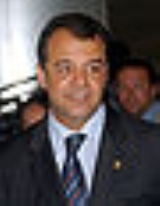
Sérgio Cabral Filho
Encyclopedia
Sérgio de Oliveira Cabral Santos Filho (born January 27, 1963), is a Brazil
ian politician
and journalist
.
In the 2006 Brazilian general elections
, he was elected governor
of the state of Rio de Janeiro
; he was sworn into office on January 1, 2007.
His father is journalist Sérgio Cabral.
Cabral Filho was a state representative for the state of Rio de Janeiro between 1991 and 2002, having presided the State Assembly from 1995 to 2002. In the 2002 general elections
, he was elected senator for the state of Rio de Janeiro, a position he occupied from January 2003 until December 2006, when he resigned in order to run in the Rio de Janeiro Gubernatorial elections, having been replaced in Senate
by Regis Fitchner.
He had also run for Mayor of the city of Rio de Janeiro in 1996 with a PSDB ticket, but his election as governor happened after he had transferred to PMDB, in which occasion he and his running mate
, Luís Fernando de Sousa, had 5,129,064 votes in the run-off
(68% of the total valid votes state-wide) with PPS
's Denise Frossard
(who had 32% of the valid votes).
Brazil
Brazil , officially the Federative Republic of Brazil , is the largest country in South America. It is the world's fifth largest country, both by geographical area and by population with over 192 million people...
ian politician
Politician
A politician, political leader, or political figure is an individual who is involved in influencing public policy and decision making...
and journalist
Journalist
A journalist collects and distributes news and other information. A journalist's work is referred to as journalism.A reporter is a type of journalist who researchs, writes, and reports on information to be presented in mass media, including print media , electronic media , and digital media A...
.
In the 2006 Brazilian general elections
Brazilian general election, 2006
The 2006 election were marked by the now extinct "verticalization rule", which forced parties to form coalitions on a state level with the same parties with which they were allied nationwide. This rule was introduced at the 2002 general elections by the Supreme Electoral Court.All Chamber of...
, he was elected governor
Governor
A governor is a governing official, usually the executive of a non-sovereign level of government, ranking under the head of state...
of the state of Rio de Janeiro
Rio de Janeiro (state)
Rio de Janeiro is one of the 27 states of Brazil.Rio de Janeiro has the second largest economy of Brazil behind only São Paulo state.The state of Rio de Janeiro is located within the Brazilian geopolitical region classified as the Southeast...
; he was sworn into office on January 1, 2007.
His father is journalist Sérgio Cabral.
Cabral Filho was a state representative for the state of Rio de Janeiro between 1991 and 2002, having presided the State Assembly from 1995 to 2002. In the 2002 general elections
Brazilian general election, 2002
Lula's Worker's Party won the most seats in the Parliamentary elections, though failed to gain an outright majority as they won only 91 of the 513 seats.-Results:...
, he was elected senator for the state of Rio de Janeiro, a position he occupied from January 2003 until December 2006, when he resigned in order to run in the Rio de Janeiro Gubernatorial elections, having been replaced in Senate
Senate of Brazil
The Federal Senate of Brazil is the upper house of the National Congress of Brazil. Created by the first Constitution of the Brazilian Empire in 1824, it was inspired by the United Kingdom's House of Lords, but with the Proclamation of the Republic in 1889 it became closer to the United States...
by Regis Fitchner.
He had also run for Mayor of the city of Rio de Janeiro in 1996 with a PSDB ticket, but his election as governor happened after he had transferred to PMDB, in which occasion he and his running mate
Running mate
A running mate is a person running together with another person on a joint ticket during an election. The term is most often used in reference to the person in the subordinate position but can also properly be used when referring to both candidates, such as "Michael Dukakis and Lloyd Bentsen were...
, Luís Fernando de Sousa, had 5,129,064 votes in the run-off
Two-round system
The two-round system is a voting system used to elect a single winner where the voter casts a single vote for their chosen candidate...
(68% of the total valid votes state-wide) with PPS
PPS
PPS may refer to:In commerce and industry* Participating preferred stock or participating preferred share* Purchasing Power Standard* Pay Per Sale, a payment method used in affiliate marketing....
's Denise Frossard
Denise Frossard
Denise Frossard Loschi is a judge and politician from Brazil. She studied law and served as a magistrate in Rio de Janeiro. She has been a law professor at the Getúlio Vargas Foundation...
(who had 32% of the valid votes).

